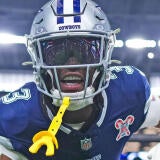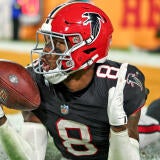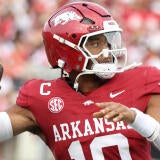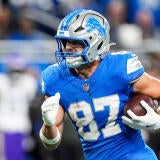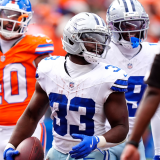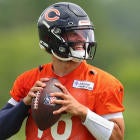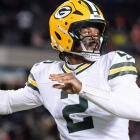Fantasy Football 2024 draft strategy: How to draft the rookie quarterback class based on history, more
Should we expect a rookie takeover, or is history our biggest teacher?

It was the second-ever minicamp practice for Bears rookie quarterback Caleb Williams. He had been functioning better after struggling with his cadence the day before, showing better accuracy overall. It was toward the end of 7-on-7 drills, plays designed to help a quarterback make better reads without a clear and present danger from a pass rush in his face. And although he had the likes of D.J. Moore, Keenan Allen and Rome Odunze on hand, on this specific play he opted to fire to backup receiver Freddie Swain on a post route. But he didn't see linebacker Tremaine Edmunds in coverage, and Edmunds leaped high to pick off Williams, the rookie's second interception in as many days.
On Williams' very next pass, he once again didn't force the ball to Moore, Allen or Odunze, instead noticing his third read, a streaking Velus Jones, down the right sideline and firing a bomb of at least 50 yards right to Jones' waiting arms a half-second before a defender arrived. Touchdown. Jubilation. Optimism in Chicago.
Bounce-back moments like these happen to every rookie in minicamp. C.J. Stroud went through the same ups and downs last spring before taking the league by storm. So did Bryce Young before he struggled. Stroud and Young represent the very best and very worst outcomes we've experienced from first-round rookie quarterbacks -- and the thought of each one will weigh on Fantasy managers as they think about Williams and his other Round 1 quarterback counterparts.
Will they be more like Stroud, or will they be humbled like Young? And what does the 2024 rookie QB class mean for their teammates?
Recent History
Stroud's 2023 season was not normal for rookie quarterbacks. In the past decade, 32 quarterbacks have been taken in Round 1. Of the 32, 10 quarterbacks averaged at least 20 Fantasy points in games they actually started, assuming they started at least four games. Eight of the 10 were top-10 picks and five were top-5 picks.
Of the remaining 22 quarterbacks, five barely played (that includes Patrick Mahomes and Jordan Love), two were top-five picks who came close to 20 Fantasy points per game (Jameis Winston, Anthony Richardson) and fifteen were first-rounders who didn't exceed 16 Fantasy points per game, including nine top-five choices, Young being the most recent example.
That's not so good.
It doesn't get much better: None of the five top-5 picks who hit 20 Fantasy points per game averaged 22 or more Fantasy points. The only three QBs to get to that number were Deshaun Watson (33.2 in six starts; picked 12th overall), Daniel Jones (22.0 in 12 starts; picked sixth overall) and Justin Herbert (26.3 in 15 starts; picked sixth overall). History suggests it is statistically rare for a Round 1-drafted rookie quarterback to put up really good numbers right away.
So why did it work for the Texans last year? It came down to Stroud taking more chances downfield -- and succeeding. He ranked second in the NFL in rate of pass attempts of 10-plus air yards and seventh in rate of pass attempts of 15-plus air yards. Nine of his 23 passing scores came on throws of 15-plus air yards and his completion rate on those throws was 51.7% with 14.3 yards per attempt, both the best rates among qualifying first-year quarterbacks since 2014. If it feels like an anomaly, it's because it is.
Nico Collins and Tank Dell thrived on those downfield throws but also had good overall target volume with Stroud -- 7.4 targets per game for Collins, 6.8 per game for Dell (remember, it's only in the games they played in with Stroud starting and doesn't include any games with someone else starting). They are two of only three wide receivers in the last 10 seasons to average more than 15 PPR points per game with a rookie QB starting despite not averaging at least eight targets per game. If it feels like an anomaly, it's because it is.
The track record for wide receivers catching passes from rookie quarterbacks isn't nearly as good as the 2023 Texans made it seem. Qualifying receivers who played at least five games with a rookie quarterback starting, regardless of when the rookie was picked, averaged 15 or more PPR points on 11 occasions in the past 10 years. This includes four receivers from last season: Davante Adams, DeAndre Hopkins and the Texans duo. Remember, these are in games where a rookie QB started -- if you only look for receivers catching passes from first-round rookies, that number drops to six, obviously including Collins and Dell. The other four receivers who qualified averaged at least 8.4 targets per game from their rookie QB.
| player | year | PPR/gm | G | 1st round rookie QB? |
| DeAndre Hopkins | 2017 | 21.52 | 6 | YES |
| George Kittle | 2022 | 18.66 | 5 | NO |
| Keenan Allen | 2020 | 18.26 | 13 | YES |
| Nico Collins | 2023 | 17.61 | 14 | YES |
| Tyler Boyd | 2020 | 16.24 | 10 | YES |
| Davante Adams | 2023 | 16.2 | 10 | NO |
| Kenny Golladay | 2019 | 15.96 | 5 | NO |
| Brandin Cooks | 2021 | 15.35 | 10 | NO |
| Golden Tate | 2019 | 15.33 | 9 | YES |
| DeAndre Hopkins | 2023 | 15.27 | 9 | NO |
| Tank Dell | 2023 | 15 | 11 | YES |
If you thought tight ends would be the best friends of rookie quarterbacks, you're only sort of right. Qualifying tight ends who played the same minimum of five games with a rookie quarterback, any rookie quarterback, averaged 10 or more PPR points just seven times over the last 10 seasons. That's way low and it does not include Dalton Schultz (he averaged 9.8 PPR per game with Stroud).
However, six of the seven met that average with not only a first-round rookie quarterback but one drafted in the top 10. Considering there have been 22 quarterbacks taken in the top 10 since 2014, that's not exactly a high hit rate.
There are pretty good reasons why it's been rare for pass-catchers to perform at a high level with rookie quarterbacks. For starters, rookies rarely come into the league and slay defenses -- you already knew that from their Fantasy performances. But rookies, especially ones drafted in the first 10 picks, join teams that stunk the year before and normally aren't surrounded by good talent. And those teams also frequently have changed coaches, offensive coordinators and playbooks, putting everyone on the roster at the level of learning a new scheme. It's often not exactly the best environment to hatch huge stats.
But it helps if the quarterback can hit downfield throws like Stroud did, not to mention throw a decent amount overall. Eight of the 10 Round 1 quarterbacks to hit 20-plus Fantasy points averaged at least 30 pass attempts in their starts with six of the eight getting to 33 or more pass attempts. And the two out of 10 that didn't average at least 30 pass attempts were Josh Allen and Lamar Jackson, both of whom supplemented their stats with rushing numbers. So if a quarterback can't get even a decent pass attempt per game average, he better run the ball.
Passing Gains
Williams isn't expected to be coddled much in Chicago's new offense. Brand new play caller Shane Waldron has been a part of multiple schemes but seems to have learned the most from Sean McVay. Calling the shots in Seattle over the past two seasons, Waldron's offenses threw the ball at the fifth-highest rate in 2023 and 11th in 2022, though neither iteration ran a high number of plays overall and both were cautious about attempting passes of 15-plus air yards downfield, registering in the bottom half of the league both seasons. At a minimum, it's an indicator that the Bears will trust Williams to throw more than 30 times per game on average; a solid minicamp with minimal off-target throws built confidence.
But Williams isn't the only rookie quarterback expected to play at some point this season. Jayden Daniels was picked second overall and figures to be the Commanders' main quarterback all year. Drake Maye, taken third overall, could be held back for part of the year on a rebuilding Patriots team. After getting drafted eighth overall by the Falcons, Michael Penix probably won't play much as he's sitting behind Kirk Cousins. J.J. McCarthy, the Vikings' 10th overall selection, must beat out Sam Darnold before starting, which figures to happen sooner than later. And Bo Nix could end up being the bargain of the bunch after getting chosen 12th overall by the Broncos.
Can these guys average 30 pass attempts per game? How often will they throw 15-plus air yards downfield, and will they be successful doing so? And will any of them run for decent numbers? This chart shows what they've done and what we can expect passing-wise.
| 2023 stats | 2024 projections | ||||||||
| Player | G | Att/G | % of Att AY15+ | AY15+ Comp% | AY15+ TD% | Non-sack Rush/G | Non-sack YPC | Att/G | % of Att AY15+ |
| Caleb Williams | 12 | 32.3 | 22.3% | 52.9% | 17.2% | 7.1 | 3.1 | 34.0 | 19.9% |
| Jayden Daniels | 12 | 27.3 | 27.4% | 63.3% | 31.1% | 10.8 | 9.2 | 31.9 | 21.2% |
| Drake Maye | 12 | 35.4 | 31.1% | 50.8% | 12.9% | 8.6 | 4.9 | 32.4 | 23.9% |
| Michael Penix Jr. | 15 | 37 | 28.6% | 49.1% | 13.2% | 2.1 | 1.5 | 0.0 | 0.0% |
| J.J. McCarthy | 15 | 22.1 | 26.2% | 55.2% | 16.1% | 4.1 | 3.9 | 33.7 | 19.6% |
| Bo Nix | 14 | 33.6 | 18.0% | 57.1% | 20.2% | 3.7 | 4.8 | 30.7 | 18.5% |
If you were already familiar with Daniels and what he's best at, you knew he's a dual-threat quarterback who can rip up defenses with his legs. His downfield passing at LSU last year was the best among his peers and early minicamp reports suggest he's impressed on anticipatory throws over the middle and deep ball accuracy. Maye flashed his cannon during the minicamp but wasn't even their primary quarterback with the Patriots' starters. Same thing with McCarthy and the Vikings as well as Nix with the Broncos, though the latter has a much clearer path to start Week 1. We already know Penix won't play unless something happens to Cousins.
The point is, the only two quarterbacks Fantasy managers will realistically consider in one-QB drafts are Daniels and Williams, and probably in that order. Williams has the better receiving corps but Daniels has the wheels to gain rushing yards like Lamar Jackson or Justin Fields did last season. That gives him the better path to getting at least 20 Fantasy points per game. I wouldn't be anywhere near as optimistic about the other rookie quarterbacks but in Superflex leagues any one of them that begins the season as a starter is worth at least a mid-round pick, especially McCarthy given his targets in Minnesota.
Moving Forward
The more impactful issue for Fantasy managers is how the pass-catchers with these rookie quarterbacks will fare. There are some big names, notably in Minnesota and Chicago with the biggest most certainly being Justin Jefferson. A lot of these guys put up great numbers without rookies before -- what's in store for them now?
What you've already read makes total sense: The more targets any pass-catcher averages, the better they'll be. Last year, Jefferson, T.J. Hockenson, D.J. Moore and Keenan Allen each averaged at least 8.0 targets per game. Commanders wideout Terry McLaurin averaged 7.8 per game. No one else on a team with a current first-round rookie had even seven targets per game in 2023.
Getting a lot of targets isn't new to any of these guys. What could be new is how their situations change. The biggest change figures to happen in Chicago, where Moore and Allen are now on the same team, so it seems kind of unlikely both will have humongous target shares. At minicamp, Moore lined up outside a lot and Allen admitted he's the Bears primary slot receiver when they use three or more wideouts. And both could lose looks to first-round rookie Rome Odunze. The trio will dominate targets for the Bears most weeks (sorry, Cole Kmet), which means there could be some inconsistencies with how much they work. It's worth noting that Moore and Odunze seemed to have the best chemistry with Williams at minicamp.
In Minnesota, Jefferson will still be the top target-getter but the door is open for Addison to reap good numbers until Hockenson comes back from his torn ACL. That might not be for a while. Even if the Vikings dial down their aggressive passing, Jefferson and Addison should still get good looks from the accurate McCarthy once he's in the saddle.
Washington's offense should still favor McLaurin, who's had at least seven targets per game for four straight seasons. He's not only a great all-around receiver but the team's best downfield target, and Daniels was a tremendous downfield thrower at LSU. All of that sounds outstanding for McLaurin, but the track record of receivers who don't get north of eight targets per game from their rookie quarterback is horrible. It's one thing to prioritize McLaurin over Jahan Dotson and rookie Luke McCaffrey, but it's another to prioritize him over other receivers
I know there are some veterans on the Patriots, Falcons and Broncos, but only Courtland Sutton has seen years with more than seven targets per game. That should change in 2024 for Drake London (6.9 in 2022 was his career high), but he'll catch passes from Cousins before Penix. Kyle Pitts has never averaged more than 6.5 targets per game, which is fine for a tight end but not a mark that will clinch greatness from him. New England's receiving corps is in flux after they drafted not one but two rookies to help re-shape the group.
That brings up one really important point involving rookie pass-catchers: In the last 10 years, exactly zero players -- wide receivers or tight ends -- saw more than 7.1 targets per game or had even 750 yards receiving or even more than seven touchdowns catching passes from a rookie quarterback. Those thresholds would be even lower if it wasn't for the Stroud-to-Dell connection in Houston last year when Dell had seven scores and 709 yards in games Stroud started on 6.8 targets per game. It's a bad combination that figures to affect Odunze in Chicago, McCaffrey and Ben Sinnott in D.C., Ja'Lynn Polk and Javon Baker in New England and Troy Franklin in Denver.
Use Kid Gloves
As much as we might wish to be optimistic about rookie QBs coming into the league, it's better to be cautious. Far too often the results have not been what we've wished for our Fantasy teams. For every big rookie breakout like Stroud, there has been literally two other quarterbacks who disappointed over the past decade.
The trickle-down effect does hit pass-catchers negatively as well. It's a two-in-three chance that a receiver who even gets eight targets per game from a first-round QB does not match 15 or more PPR points. And if a receiver doesn't get to eight targets per game then his chances get even darker.
Stroud was an exception, not the rule. And it's very possible that Williams or any of these ballyhooed rookies will be instant Fantasy heroes. But don't reach for them, and only reach for the guys they'll throw to if and only if you think they'll see at least eight targets per game. That might only be Jefferson, though Moore in Chicago should be in that range too.
If you have doubts, then when it comes to these players, stay out.

